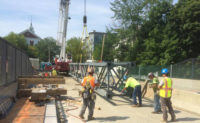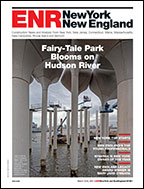New Jersey Governor Chris Christie today killed the $8.7 billion Trans-Hudson River passenger rail tunnel project that was expected to double commuter train capacity between New Jersey and Manhattan.
Christie said he feared cost overruns on the Access to the Region�s Core (ARC) project could cost the state between $2 billion and $5 billion, despite commitments of $3 billion each from the Federal Transit Administration and the Port Authority of New York and New Jersey.
�I will not allow taxpayers to fund projects that run over budget with no clear way of how these costs will be paid for,� Christie said. �The ARC project costs far more than New Jersey taxpayers can afford and the only prudent move is to end this project.�
Christie, who halted construction on Sept. 10 to conduct a 30-day review of the project, said the study confirmed that costs are expected to exceed the current budget possibly by nearly $6 billion. The state would have been on the hook for any costs over the $8.7 billion budget agreed upon by New Jersey Transit, the Port Authority and the FTA.
According to a report filed to the governor by his ARC Project Executive Committee, about $478 million in cash had been spent on the project as of Sept. 30.
In August, both the FTA and NJ Transit submitted updated project cost ranges in order to finalize a federal Full Funding Grant Agreement that needed to be reached before the project officially qualified for the $3 billion federal share. NJ Transit estimated the project would cost between $8.7 billion and $10 billion while the FTA submitted a range of $10.9 billion to $13.7 billion. Neither range included costs for the construction of a new $775 million railroad bridge which, according to the governor�s office, was necessary for the operation of the railroad after the tunnel was finished. After the 30-day review, the final agreed-upon range was between $11 billion and $14 billion, including the cost of the railroad bridge.
�The current economic climate in New Jersey simply does not allow for this project to continue considering the substantial additional costs that are required,� said Jim Weinstein, executive director of New Jersey Transit. �The ARC project is just not a financially viable project that we can responsibly move forward.�
Construction began last year with Ferreira Construction of Branchburg, N.J. starting work on a $13.6 billion underpass at Tonnelle Avenue in North Bergen, N.J. The underpass was adjacent to where the tunnel would have begun its descent under Palisades Mountain. A $258.7 million contract for the Palisades segment of the tunnel was awarded in January to a joint venture of Schiavone Construction, Secaucus, N.J., Shea Construction, Walnut Calif. and Skanska USA Civil of New York. An additional $583 million contract for the Manhattan segment of the tunnel was awarded to a joint venture of Barnard of New Jersey, part of Barnard Construction of Bozeman, Mont. and College Point, N.Y.-based Judlau Contracting.
A tri-venture called the CM Consortium, consisting of Tishman Construction Corp., Parsons Transportation Group and ARUP � all based in New York � was handling construction management for the entire project, which was long-touted as a boon for the New York region�s struggling construction industry as it promised nearly 6,000 jobs.
�We�re disappointed to say the least, but on the other hand, we understand fiscal responsibility,� said Jack Kosis, chief executive officer for the Associated General Conractors of New Jersey. �If it�s true that the tunnel is anticipated to be $11 billion to $14 billion and we only have $8.7 billion to play with, then we simply don�t have the money.�
Kosis said the AGC is unsure where the overruns would occur and that he is trying to obtain the data Christie used to make his determination.
�We want to work with the governor to find ways to fund our construction, here, but until we know what was in that data we don�t really know where they think the project was going to exceed the budget.�
Christie�s opponents say the governor�s decision was hastily made, after only a cursory analysis of the project�s budget projections.
�A decision this momentous needed to wait until such time as an exhaustive review of all potential cost saving measures and new revenue sources could be completed,� said Richard T. Anderson, president of the New York Building Congress in Manhattan.
�Cancelling the tunnel project is not just bad transportation policy,� said U.S. Sen. Frank Lautenberg (D-N.J.), a long-time proponent of the project. �It�s bad fiscal policy.�



Post a comment to this article
Report Abusive Comment